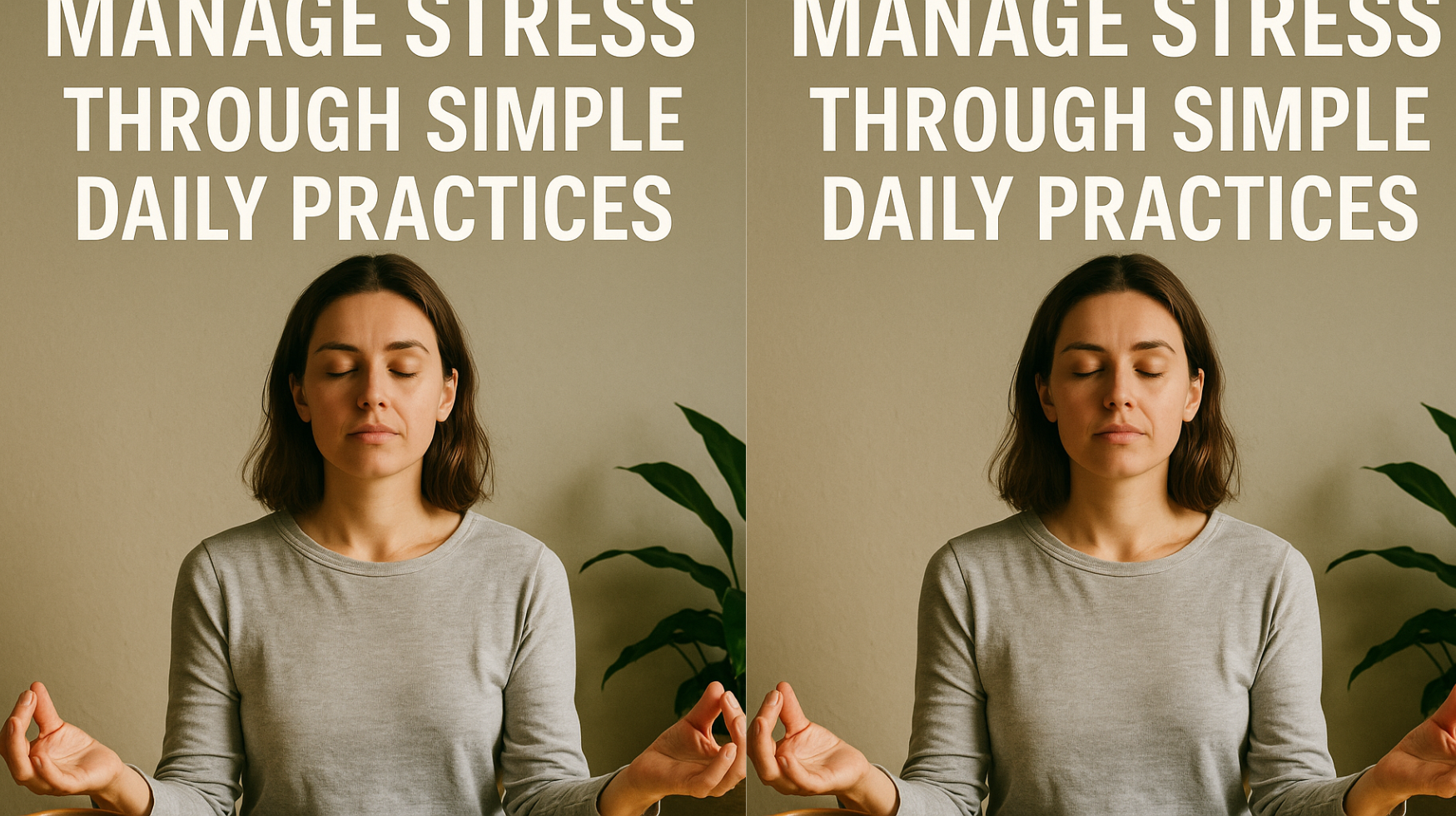Introduction: Stress Is Unavoidable, But Burnout Is Preventable
In today’s fast-paced world, stress has become a constant companion for many people. Deadlines pile up, responsibilities multiply, and digital notifications seem endless. While short bursts of stress can sharpen focus and motivate action, chronic stress can quietly harm your body and mind—draining your energy, disrupting your sleep, and even increasing the risk of serious health problems.
The good news is that you don’t need to completely change your life to manage stress effectively. By incorporating a few simple, consistent daily practices, you can train your body and mind to stay calmer, think clearer, and bounce back faster when challenges arise.
In this comprehensive guide, you’ll learn:
- What stress really is and how it affects your body
- The difference between helpful and harmful stress
- Science-backed daily habits that reduce stress
- Practical tools you can start using today to feel more balanced
Understanding Stress and Its Impact on Health
The Science Behind Stress
When you encounter a challenging situation, your brain’s amygdala signals your adrenal glands to release cortisol and adrenaline. These hormones prepare your body for the classic “fight or flight” response—raising your heart rate, increasing blood pressure, and sharpening your senses.
This reaction is helpful in emergencies, but when it happens too often—due to constant work pressure, financial worries, or personal conflicts—your body remains in a heightened state of alert. Over time, this chronic stress can:
- Suppress immune function
- Contribute to heart disease and high blood pressure
- Disrupt sleep patterns
- Trigger anxiety and depression
- Cause digestive problems and chronic pain
Acute vs. Chronic Stress
- Acute Stress → Short-lived, specific trigger (e.g., public speaking or running late for a meeting). Usually fades quickly.
- Chronic Stress → Long-term, ongoing (e.g., caregiving for a sick relative, job insecurity). Slowly erodes health if unmanaged.
Our goal isn’t to eliminate stress completely—since some stress can be motivating—but to manage and reduce chronic stress so it doesn’t damage our well-being.
Daily Practices to Manage Stress Effectively
The best stress management strategies are small, realistic habits you can maintain daily. Here are 12 proven techniques, supported by science, that you can start today.
1. Start Your Day with Calm Intention
How you begin your morning sets the tone for the rest of your day.
Practical Tips:
- Avoid grabbing your phone immediately after waking up.
- Spend 5–10 minutes stretching, meditating, or journaling.
- Try the 4-7-8 breathing method: inhale for 4 seconds, hold for 7, exhale for 8. This slows your heart rate and reduces anxiety.
Why It Works:
Morning mindfulness reduces cortisol spikes and helps you feel in control before daily demands hit.
2. Move Your Body Daily
Physical activity is one of the fastest ways to reduce stress hormones.
Examples:
- 20-minute brisk walk
- 10 minutes of yoga
- Dancing to your favorite playlist
- Strength training sessions 2–3 times per week
Why It Works:
Exercise increases endorphins (natural mood boosters) and improves sleep quality, which indirectly reduces stress.
3. Practice Mindfulness Throughout the Day
Mindfulness is the practice of paying attention to the present moment without judgment.
How to Apply:
- During lunch, focus only on eating—notice flavors, textures, and smells.
- Set a reminder every two hours to pause, take three deep breaths, and observe how your body feels.
Why It Works:
Mindfulness interrupts the “autopilot” stress response and lowers activity in the amygdala, the brain’s stress center.
4. Stay Socially Connected
Isolation can increase stress, while healthy relationships offer emotional support.
Daily Action:
- Call, text, or voice message a friend or family member—don’t just wait for them to reach out.
- Schedule a coffee break or short walk with a colleague.
Why It Works:
Human connection releases oxytocin, a hormone that reduces stress and fosters trust.
5. Manage Your Workload Wisely
Overcommitment is a major stress trigger.
Practical Steps:
- Identify your top 3 priorities each morning.
- Use the Eisenhower Matrix to decide which tasks to do, delegate, schedule, or drop.
- Learn to say “no” when necessary.
Why It Works:
Clear prioritization prevents overwhelm and helps you focus energy where it matters most.
6. Use Mini Breaks to Recharge
Short pauses throughout the day prevent mental burnout.
How to Apply:
- Follow the Pomodoro Technique: 25 minutes focused work + 5 minutes break.
- Stand up, stretch, or take a brief walk every hour.
Why It Works:
Mini breaks help regulate blood flow, refresh focus, and reduce muscle tension.
7. Practice Gratitude
Gratitude shifts your perspective from what’s wrong to what’s right.
Daily Action:
Write down three things you’re grateful for before bed. Include small wins, like “had a good cup of coffee” or “laughed with a friend.”
Why It Works:
Research shows gratitude practices can lower depression symptoms and increase life satisfaction.
8. Limit News and Social Media Consumption
Constant exposure to negative headlines and comparison-driven content increases anxiety.
Practical Steps:
- Set two specific times a day to check the news.
- Unfollow or mute accounts that trigger stress.
9. Create a Relaxing Evening Routine
Your nighttime habits directly affect your stress resilience.
Ideas:
- Take a warm shower or bath.
- Read a physical book (avoid screens 1 hour before bed).
- Listen to calming music or a guided meditation.
Why It Works:
Evening rituals signal your nervous system to shift from “alert” to “rest” mode.
10. Sleep as a Stress Recovery Tool
Quality sleep is the ultimate stress buffer.
Tips for Better Sleep:
- Keep your bedroom cool, dark, and quiet.
- Avoid heavy meals and caffeine close to bedtime.
- Maintain consistent sleep and wake times—even on weekends.
11. Nourish Your Body
What you eat affects your mood and stress levels.
Stress-Reducing Foods:
- Leafy greens (magnesium helps regulate cortisol)
- Fatty fish (omega-3s reduce inflammation)
- Nuts and seeds (healthy fats for brain function)
Avoid:
- Excessive sugar
- Highly processed foods
- Too much caffeine
12. Combine Breathwork with Movement
Practices like yoga, tai chi, and qigong integrate breath control with gentle movement, activating the body’s relaxation response.
Sample Daily Stress-Management Plan
Morning:
- Wake up without phone use for first 20 minutes
- 4-7-8 breathing (5 minutes)
- Gratitude journaling (3 things)
Midday:
- 20-minute walk during lunch break
- 5-minute mindful breathing session
Evening:
- Limit news/social media after dinner
- 15-minute yoga or stretching session
- Read or listen to music before bed
Final Thoughts: Build Your Resilience One Day at a Time
Stress will always be part of life—but how you respond to it determines whether it drains you or drives you. By weaving these simple, science-backed habits into your daily routine, you’ll not only manage stress more effectively but also improve your health, relationships, and overall happiness.
Start small, pick one or two practices from this list, and add more over time. Consistency is what transforms these habits into a natural part of your lifestyle—helping you stay calm, focused, and energized no matter what challenges come your way.

